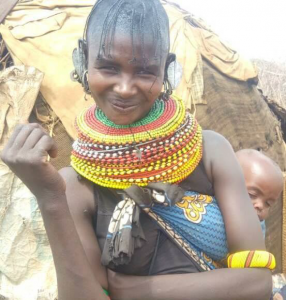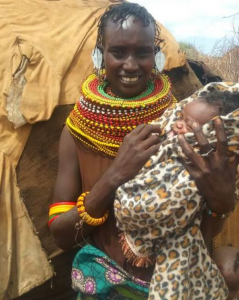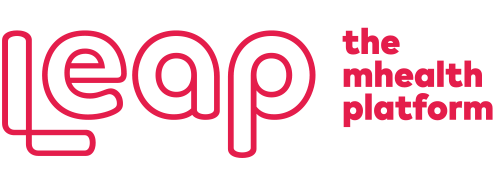CHW defies culture, urges women to go for skilled delivery
Lochuch Lokitare, a Community Health Worker (CHW) linked to Marti Community Unit (CU), Samburu County, will never forget the evening of 16 February 2017. She was heavily pregnant and had just done her household visits when she met with one of her neighbours. Something was off about him but she could not quite place what. After a few minutes, she saw the machete on his hand. He quickly raised it and tried to hit her with it but she ran off. She screamed for help and other neighbours came out and protected her. “Do not speak to my wife again about going to hospital to deliver!” shouted the man.
Lochuch was traumatised by the event and decided to stay at home and not visit any of her households for a few days. A few other CHWs in the CU went to console and encourage her and soon, she was back doing what she loved the most; talking to her community about the importance of skilled delivery.

CHW Lochuch Lokitare
“The very first stop I made was to the neighbour that tried to kill me. This time, I requested to speak with the husband. He was calmer and I was able to explain why I had encouraged his pregnant wife to go to hospital,” narrates Lochuch. According to Samburu culture, a woman who gives birth in the hospital is weak. Through her determination, Lochuch was able to convince the man by demystifying the premise. She mentioned all the women in the village who had died, and who had lost children during home delivery. “In my community, livestock is the most precious asset. The second most important asset is the children. I convinced the man by telling him that skilled delivery would ensure safe birth to a child who will help him take care of his livestock.” explains the young mother of two.
That very night, the neighbour’s wife went into labour. Lochuch was able to send a chat message, through Leap, the mHealth platform, to other CHWs residing in Marti, a nearby town, who then called a community ambulance that took the mother to hospital. The community ambulance is maintained by a committee, which gives permission for use. So, every time Marti CU needed it, they had to call the chair of the committee and request permission to use the vehicle. Sometimes, permission is denied, but on this day, it was granted.
Barely three months later, and with a child of her own, Lochuch yet again saved a life. A woman in one of her households, Akope Lokure, went into labour in the middle of the night. Lochuch knew that everyone was asleep but she quickly sent a chat message to her fellow CHWs to call the ambulance. Josephine Ekiru, a fellow CHW, saw the message first and called the nurse at Marti Dispensary. The nurse, Purity Murage, quickly called the chair of the ambulance, but this time, permission to use the ambulance was denied.
“We were frustrated. It was not the first time they had denied us use of the ambulance. The previous time, a newborn died due to complications of prolonged labour and I did not want to see that happen again,” explains Josephine. Together, Josephine and Purity called other CHWs in the area and they all went to the chair’s house. “It was around 1am and we told him that we will not leave without the ambulance. I think he became annoyed, but we were such a large number, that he agreed to give us the ambulance,” narrates Josephine. At the time, the ambulance was in a garage in Marti, which is 15 kilometres away from Charda, Lochuch’s village. Despite the short distance, the ambulance took one and a half hours to get to the village due to bad roads.

Akope Lokure is happy that CHW Lochuch convinced her to give birth in a health facility
“When we got to Charda, we found Lochuch and Akope next to the road. The labouring mother had passed out by the roadside so we quickly got into the ambulance and rushed to Marti Dispensary. Both mother and baby were saved,” explains Purity, who had undergone a Basic Emergency Obstetric and Newborn Care (BEmONC) training, under the Uzazi Salama project. “Due to the BEmONC training I had received, I was well prepared for the emergency,” adds Purity.
The passion and dedication of Lochuch and her fellow CHWs has seen an increase in skilled delivery in Marti Dispensary since the formation of the CU. The CHWs were trained under the Uzazi Salama project, a partnership between Amref Health Africa and PharmAccess, with funding from the Mpesa Foundation, through Leap, an innovation by Amref Health Africa. Leap is a mHealth platform that teaches CHWs, and any other interested party, through the mobile phone. The platform can run on basic mobile phones and has been used by Amref Health Africa to instill knowledge easily and affordably to CHWs in rural areas.
Through Uzazi Salama, nurses and other health care professionals in Samburu County have also been trained on BEmONC and are well equipped to handle emergencies, and health facilities have been equipped with numerous needed items to ensure better service provision, through SafeCare. Additionally, mothers are given mother-baby packs, which have oil, diapers, baby clothes and toys.
“I am grateful for the training I got that allowed me to be a CHW. Without that training, I would not have been able to save mothers and children in my village. I would like to be trained on other things, especially on health conditions regarding the eye (Trachoma), as we have a lot of such cases, even in babies,” concludes Lochuch.
Story by: Michelle Dibo – Communications, Amref Health Africa

